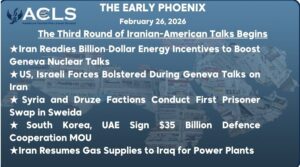TOP HEADLINES:
- Israel’s Military Intelligence Chief Resigns Over October 7 Intelligence Failures
- US May Sanction More Israeli Units Over Human Rights Concerns
- Qatar May End its Role as Mediator Between Israel and Hamas
- Assad Acknowledges Ongoing Talks to Improve Relations with the U.S.
- Erdogan’s Strategic Visit to Iraq Threatens PKK
=======================
★ ISRAEL & PALESTINIAN TERRITORIES
-
Israel’s Military Intelligence Chief Resigns Over October 7 Intelligence Failures
Major General Aharon Haliva, head of IDF Military Intelligence, has resigned due to intelligence oversights related to the Hamas attack on October 7. In his resignation, Haliva called for a state inquiry to thoroughly investigate the failures that led to the attack. Haliva will remain in his role until a successor is appointed, concluding his 38 years of service in the IDF.
-
US Considers Sanctioning More Israeli Units Over Human Rights Concerns
The US is contemplating sanctions against additional Israeli military units beyond the Netzah Yehuda Battalion for alleged human rights violations against Palestinians, according to The Times of Israel. These deliberations are part of a broader US policy that criticizes Israeli actions in the West Bank while supporting Israel’s right to self-defense. The Netzah Yehuda Battalion, known for misconduct in the West Bank, is set to be the first sanctioned, limiting their access to US military aid.
-
Israel Asks U.S. to Reconsider Sanctions on Military Unit
Israeli Defense Minister Benny Gantz has requested U.S. Secretary of State Antony Blinken to reconsider sanctions imposed on the “Netzah Yehuda” battalion of the Israeli military. Gantz argued that such sanctions could undermine Israel’s international legitimacy during its operations against Hamas in Gaza, claiming there was no justification for the U.S. action. He emphasized the strength and independence of the Israeli judicial system and the adherence of all military units to international law. The potential U.S. sanctions have raised concerns in Israel, with Prime Minister Netanyahu vocally opposing them, citing the timing relative to past events in the West Bank.
-
Israel Sought to Demonstrate it Can Strike Iran Without Entering Iranian Airspace
Israeli officials disclosed to The New York Times that Israel has opted not to expand its attacks on Iran following diplomatic pressures from the U.S. and allies. Instead, Israeli forces conducted limited missile launches from hundreds of kilometers away and deployed small drones to disrupt Iranian air defenses. This strategy was meant to demonstrate Israel’s ability to target Iran effectively without entering its airspace or triggering its air defense systems.
-
Fatah Accuses Hamas of Manufacturing Gaza Food Crisis
Fatah officials have accused Hamas of exacerbating the humanitarian crisis in Gaza by attacking aid workers, stealing vital supplies, and controlling food distribution, which has led to inflated prices. According to reports on Fatah TV and Palestinian Media Watch, Hamas’s actions have prevented other organizations from providing relief and monopolized aid resources, contributing to severe shortages and suffering among the civilian population.
-
Israeli Defense Minister Visits Syrian Border, Warns Israel Will Counter Iranian Presence
On a visit to the Golan Heights, Israeli Defense Minister Yoav Gallant emphasized the military’s preparedness for offensive operations to prevent Iranian entrenchment near the Syrian border. Gallant emphasized the strategic patrols with division commanders and the high readiness of Israeli forces to thwart any threats from Hezbollah and Iranian forces attempting to establish positions near the Golan Heights. Gallant detailed significant preparatory efforts to ensure the safety and return of residents to northern Israel.
=======================
★ IRAN
-
Iran Pressures European Nations to Halt Arms Sales to Israel
Iran’s Foreign Minister, Hossein Amirabdollahian, called on European countries to stop arms sales to Israel to facilitate an end to the Gaza conflict. In discussions with Finland’s Foreign Minister Elina Valtonen, Amirabdollahian said that ending weapon supplies to Israel, which he accused of aggression in Gaza, is crucial for peace and could help mitigate regional tensions and protect civilians. Valtonen expressed Finland’s concerns over the humanitarian situation in Gaza and advocated an immediate, unconditional ceasefire.
-
Iran-Backed Militants Attack US Bases in Syria
Missile and drone strikes have targeted two American military bases in northeastern Syria. Lebanese media sources reported that the Al-Omar Oil Field base was hit by four missiles, while the Kharab al-Jir base suffered attacks from three missiles and a drone. Explosions were confirmed at the Al-Omar site. These incidents are part of a series of attacks on US facilities in the region.
-
Tehran University Students Protest Against Hijab Rules
Students at Tehran’s Amir Amirkabir University of Technology boycotted classes in protest against strict hijab enforcement that saw over 200 students barred from campus. The strike, announced via a student-run newsletter, highlights ongoing resistance to the Iranian government’s rigid dress code policies. This action follows a wider movement ignited by Mahsa Amini’s death in morality police custody, challenging the intense security measures and dress code impositions at universities, including the use of facial recognition technology to enforce compliance.
=======================
★ YEMEN
-
EU Begins Indirect Negotiations with Houthis for Red Sea Shipping Security
Following the withdrawal of their warships from the “Eunavfor Med Irini” mission, European Union countries commenced negotiations to secure the safe passage of their ships through the Red Sea. These discussions, facilitated through Oman with Houthi representatives, focus on coordinating safe transit via the Bab al-Mandab Strait. This initiative comes after Germany became the fourth EU country to pull its frigate from the mission, joining Belgium, Denmark, and France.
-
Report: New Negotiation Round Planned Between Yemeni Government and Houthis
Informed political sources suggest that a new round of negotiations between the Yemeni government and the Houthi group is expected under the auspices of the UN Special Envoy for Yemen. Omani mediators reportedly persuaded the Houthi leadership to return to dialogue, based on previous agreements that include a peace roadmap. This upcoming round aims to finalize the peace agreement, establish a ceasefire, address civil rights issues like employee salaries and prisoner releases, and regulate air and sea movement restrictions at Sanaa International Airport and Hodeidah Port to prevent weapon smuggling.
=======================
★ IRAQ
-
Iraq’s Hezbollah Brigades Deny Resuming Attacks on U.S. Forces
Iraq’s Hezbollah Brigades denied a Reuters report that they have resumed attacks on U.S. forces. The denial followed another statement allegedly linked to the group announcing an end to a three-month halt on such activities. Additional sources from Alhurra TV and Iraqi security also confirmed the absence of new attacks. These reports have come immediately after Iraqi Prime Minister Mohammed Shia’ Al Sudani visited Washington for talks on U.S.-Iraq strategic relations.
=======================
★ SYRIA
-
Assad Acknowledges Ongoing Talks to Improve Relations with the U.S.
Syrian dictator Bashar al Assad, currently under US sanctions, revealed in a recent interview that Syria has sporadically engaged in meetings with the United States to discuss potential avenues for mending ties after years of estrangement during the Syrian civil war. Assad expressed continued hope for reconciliation despite the lack of substantial outcomes from these meetings. Additionally, he mentioned attempts to improve relations with countries outside the Western bloc, including a notable visit to China.
=======================
★ LEBANON
-
Hamas Militants Resume Rocket Attacks on Israel from Southern Lebanon
After weeks of pausing attacks, Hamas’ military wing, the Al-Qassam Brigades, renewed its rocket attacks from southern Lebanon, targeting an Israeli military base in Galilee with 20 Grad rockets. Hamas announced the attacks were a response to Israeli actions in Gaza and the West Bank.
-
Geagea Says Syrian Refugees Have Become an Existential Issue for Lebanon
Samir Geagea, leader of the Lebanese Forces, emphasized the Syrian refugee issue in Lebanon has become an existential crisis for Lebanon on demographic, economic, and social levels. In an interview with L’Orient Le Jour, Geagea also argued against separating the south from the rest of Lebanon and asserted the importance of returning refugees to Syria where safe zones exist. He criticized Hezbollah and the Free Patriotic Movement for undermining the state-building process and disrupting municipal elections.
-
Cyprus Promises Lebanon Aid Package to Curb Syrian Refugee Flow to EU
Cyprus President Nicos Christodoulides announced preparations for an agreement with Lebanon to prevent the flow of Syrian refugees to the European Union. This initiative includes a forthcoming visit to Lebanon alongside European Commission President Ursula von der Leyen to unveil an EU financial aid package. The aid aims to stabilize Lebanon and limit further refugee influx to Cyprus, which has seen a significant increase in migrant arrivals. Cyprus is also increasing measures to deter refugees from reaching its shores by boat from Lebanon.
-
Washington Seeks to Separate Lebanese Presidential Election Stalemate from South Lebanon Conflict
Washington is promoting a “third option” strategy that separates the Lebanese presidential election from Resolution 1701. This approach aims to overcome the presidential election stalemate while preventing the expansion of conflict into southern Lebanon and addressing the Syrian refugee crisis in Lebanon. The U.S. and France are coordinating on these issues.
=======================
★ GULF REGION
-
U.S. Reaffirms Support for Qatari Mediation in Gaza, but Doha is Rethinking its Mediator Role
A U.S. diplomat in Cairo reiterated Washington’s support for Qatari mediation efforts in Gaza and expressed U.S. confidence in Qatar as an effective intermediary. The statement comes as Qatar is reevaluating its mediation role due to political pressure and the apparent collapse of talks between Israel and Hamas for a cease fire and hostage/prisoner exchange. Additionally, there are indications of an expanded mediation role for Turkey, aligning with U.S. strategic interests to influence the situation in Gaza through broader regional involvement.
-
Israeli Officials Acknowledge Qatar as Indispensable Mediator with Hamas
Israeli officials admitted to the Israeli Broadcasting Corporation that no other nation but Qatar could broker a deal between Israel and Hamas. Despite recent criticisms of Qatar, including accusations from Israel’s Economy Minister and a U.S. Congressman questioning the effectiveness of Qatar’s mediation, top Israeli authorities confirmed Qatar’s compliance with Israeli requests. This includes hosting Hamas leaders and aiding Gazan families on Israel’s behalf. Qatar is reevaluating its mediation role.
=======================
★ EGYPT AND NORTH AFRICA
-
Egypt Expects $400 Million from UK to Bolster Budget
Egypt anticipates receiving $400 million from the United Kingdom over the next two years to support its budget as part of a broader $6 billion aid package from the World Bank announced earlier. Egyptian Minister of International Cooperation Rania Al-Mashat indicated that these funds, intended to alleviate the nation’s economic challenges, would accompany budget financing from the World Bank. The first installments are expected by July, contributing to Egypt’s comprehensive international support to revitalize its economy.
-
Egypt Will Suspend LNG Exports as Summer Begins
Egypt’s Ministry of Petroleum spokesperson, Hamdi Abdel Aziz, announced that the country will halt LNG exports starting May, citing increased domestic consumption during the hot summer months rather than power supply issues. This move, which was implemented last May and reversed post-summer, aligns with past practices to accommodate rising local energy needs. Abdel Aziz emphasized that this suspension was planned and not related to any contractual failures, highlighting Egypt’s strategic adjustments to manage its energy resources amid escalating temperatures and consumption.
=======================
★ TURKIYE
-
Erdogan’s Strategic Visit to Iraq Threatens PKK, Bolsters Ankara-Baghdad Ties
In his first visit to Baghdad since 2011, Turkish President Recep Tayyip Erdogan’s trip is set to address significant bilateral issues, including water and energy, counter-terrorism efforts, and the suppression of the PKK. Erdogan’s visit will include strategic agreements on water management and regional security. Turkish Foreign Minister Hakan Fidan announced that over 20 agreements will be signed with Iraq during the visit to Baghdad. The deals aim to institutionalize bilateral relations and promote regional stability and development. Concurrently, Iraq’s Minister of Water Resources, Aoun Dhiab, highlighted the significance of the Tigris and Euphrates rivers’ water rights during the visit, emphasizing the goal of securing equitable water shares for Iraq according to established agreements.
-
US and Turkey Hold Counterterrorism Talks As Turkey-PKK Conflict Intensifies
The US and Turkey have intensified their counterterrorism collaboration during recent discussions in Ankara, focusing on threats like ISIS and al-Qaeda. Despite ongoing disagreements over the US support for the YPG in Syria, the renewed dialogue aims to combat terrorist travel, disrupt crime networks, and counter financial channels used by terrorist groups.
-
Turkey Ranks as One of the Top Military Spenders Globally
Turkey’s military expenditure reached $15.8 billion in 2023, placing it 22nd globally, as reported by the Stockholm International Peace Research Institute (SIPRI). This marked a 37% increase from the previous year, contributing to a 59% rise since 2014. Turkish defense exports also hit a record $5.5 billion, underlining its growing self-reliance in the defense sector.
=======================
📌 Incase you missed it,
📰 THE EARLY PHOENIX April 18 , 2024
📰 THE EARLY PHOENIX April 17 , 2024
📰 THE EARLY PHOENIX April 16 , 2024
🔗 Follow the latest news from the American Center for Levant Studies via Google News



